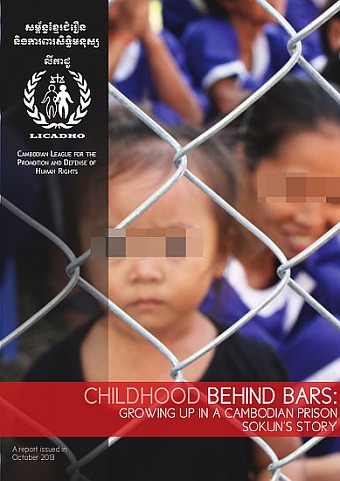Childhood behind bars - Growing up in a Cambodian prison
Published on 15 October 2013In Cambodia there are currently 38 young children living in prison with their mothers in the prisons monitored by LICADHO. Whilst these children are not prisoners, they are too often treated as such.
LICADHO’s latest report “Childhood behind bars: Growing up in a Cambodian prison – Sokun’s story” details the experiences of one such child, ‘Sokun’ (not his real name), who lived with his incarcerated mother in Phnom Penh’s Correctional Center 2 (CC2) prison until he was six years and ten months old.
This report is the first in a series of case studies to be issued by LICADHO assessing the impact on children of growing up in Cambodian prisons. The series aims to provide a greater, in-depth understanding of the physical and psychological consequences for children who have lived with their mother in prison.
“The reality of Cambodian prisons is harsh for anyone, but for a child it can be devastating,” said LICADHO Prison Supervisor Nget Sokun, “these children are often forgotten by society, but worse still, they are too often ignored by the authorities responsible for them.”
The report finds that, whilst there are some obvious benefits when children stay with their mothers, the Cambodian prison system is simply incapable of providing for most of a child’s basic needs, including education, family life, proper nutrition and medical care. Children, isolated from the rest of the world and badly nourished, often acquire severe developmental problems and have a difficult time adjusting to society once they leave prison.
LICADHO undertook the assessment of Sokun with the NGO Chibodia who have cared for him since he left prison in January 2012.
In prison Sokun was locked away for many hours a day in an overcrowded and hot prison cell. He lived in a violent and tense environment where fighting, gambling and cursing were commonplace. This report examines the impact of these prison experiences on Sokun who still suffers nightmares and flashbacks, steals food and other small items and displays panic symptoms and unusual fears of physical injury.
The report provides specific recommendations to Cambodian authorities on how to manage and improve the situation of incarcerated children in Cambodian prisons.
“Sokun’s story shows how important it is to protect children housed in prison with their mother,” said LICADHO Director Naly Pilorge. “And it provides only a glimpse of what can happen when appropriate measures are lacking.”
Due to the overall lack of research on this topic in Cambodia, LICADHO hopes that authorities and partner organizations will follow this initiative by taking steps to better understand and promote the rights of children in prison, to review the decision making processes that lead to children accompanying their mother to prison and to assess the impact of imprisonment on children.
For LICADHO’s previous reports on the issue of children incarcerated with their mother in prison, please see:
Briefing paper - A review of the conditions of mothers, pregnant women and young children living in ten Cambodian prisons, July 2010
http://www.licadho-cambodia.org/reports.php?perm=141
Report - Innocent Prisoners: a LICADHO Report on the Rights of Children Growing up in Prisons, June 2002
http://www.licadho-cambodia.org/reports.php?perm=34
For more information, please contact:
▪ Ms. Nget Sokun, LICADHO Prison Project Supervisor (Khmer) – 016-797-305
▪ Ms. Naly Pilorge, Director of LICADHO (French, English) – 012-803-650
PDF: Download full statement in English - Download full statement in Khmer
MP3: Listen to audio version in Khmer








